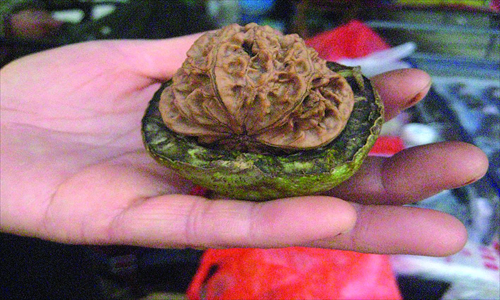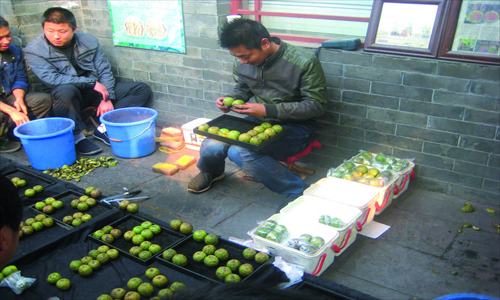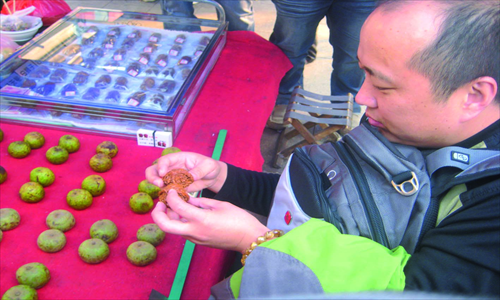Game of clones



A crowd of people piled into a corner at Tianjiao Culture Market in the Shilihe area of Chaoyang district, holding their breath as if they were waiting for something big to happen.
In the center of the crowd was Zhang Jing, a 30-year-old local resident from Xicheng district, who works in hotel management. Zhang had just paid around 400 yuan ($63.8) to Gu Fengzhi, a walnut vendor who has been in the business for 20 years, for a particular set of newly picked walnuts.
Zhang and everyone else nervously watched Gu peeling off the green outer layers skillfully with a knife. Then two fresh walnuts with white shells were revealed in front of the crowd.
Gu measured the nuts and declared, "Both are 45 millimeters (in diameter). What a fine pair!"
"This has been worth it," Zhang said, visibly relieved and a little thrilled with the result.
Zhang is a newcomer when it comes to collecting and appreciating walnuts. He inspected the shape and grain of them carefully, as the crowd congratulated him, saying "Not bad for a beginner! Preserve them well, young man."
Everyone was there to witness and be part of du he tao, which means "walnut gambling" in Chinese, a traditional activity during mid-autumn every year for walnuts collectors and opportunists. It is a most unusual type of gambling that you won't find elsewhere.
What lies beneath
The game of playing with and gambling on walnuts is popular across the whole country, especially in Beijing, Tianjin and their surrounding areas.
Gu and a dozen other vendors have been selling green walnuts on the market since late August. Each vendor does at least 20 or 30 deals every day.
The walnuts hidden inside could be worth thousands of yuan. Why do a couple of green walnuts have such an enormous potential value?
There is a tradition in China of people cradling walnuts in their hands. In this case the nuts are not for food, but for playing with, and are also known as a kind of antique.
Depending on the type, size, grain, shape, age of the walnut and also the resemblance of the pair, two walnuts could either be worthless or worth a fortune.
"You'll never know what's coming out of the green skins and that's the excitement of this game," another player surnamed Ren told Metro Beijing.
All the walnuts on the market are picked out beforehand and then displayed in pairs, similar in size and appearance. "There were tens of different types, and I have all the fine ones, one called mopan, which cost 400 yuan a pair to bet on, and nanjiangshi, which is 1,500 yuan a pair," said Gu.
If the two walnuts aren't a match, Gu offers a backup walnut to replace one of the pair, for an extra charge.
In the eyes of the inexperienced, there are no significant differences among the green nuts, but an experienced gambler has some ways to compare and contrast.
"First, rule out the deformed ones," said Liu Jianjun, 30, an expert in walnut appreciation. Then check the ridges, the navel and the pointed end, and make sure they are in the right position and resemble each other.
Although Zhang was new to this, all the hours he spent beforehand studying related strategies benefited him well. Considering his first attempt "quite successful", Zhang planned to continue with this exciting game, and "try a pair of nanjiangshi next time".
The best record from Gu's stand this year was a couple of nanjiangshi at the cost of 1,000 yuan, and the gambler got an excellent pair worth approximately 8,000 yuan.
However, most buyers weren't that fortunate. "Examine all you want, but this game is all about luck," said Liu.
Going nuts
A few months ago, Gu inspected the walnut trees in Hebei Province and picked out a few trees she was satisfied with.
Then she negotiated with the walnut farmer and bought all the nuts from each tree for a price of between 20,000 and 500,000 yuan, depending on the type and the quality.
She waited until the walnuts were mature enough to be picked and shipped them to Beijing to sell.
This business is highly profitable. "One of my friends surnamed Yang, the best vendor in town, can make 5 or 6 million yuan in one year," said Liu.
Besides the vendors, the farmers are paid well too. Many farmers used to grow walnut trees for food. But now they grow them for collecting purposes, and learned how to graft the nuts, even using splints to reshape them.
But the risks are enormous too, since millions of yuan are paid on undeveloped walnuts and the harvest is unpredictable. "If the walnuts turn out to be too small in size or imperfectly developed, then your investment is gone," Gu said.
Fraudulence also exists in the business. "No top types can be found on the gambling market," Liu explained. The vendors have already picked out the finest and left only the mediocre ones for people to choose from.
Therefore Liu believes that the situation never arises when the gambler gets a pair worth tens of thousands of yuan.
"Gambling is for beginners and those who do it for fun," Liu said. "A true player will choose a pair from a store instead," he added.
Kernel culture
"This is a tradition we don't want to lose," noted Liu, while he played with a pair of walnuts in his hands. "It's like raising a pet."
The walnuts grow as the player cradles them in their hands. The color, texture, transparency and touch will change gradually as the years pass.
To the surprise of many, nowadays walnut players are mainly young men between the age of 25 and 40, instead of the older people one would expect. Since the old generation often had little money growing up, they can't understand spending so much on a couple of nuts, Liu explained.
"This game attracts foreigners too," he added. Liu has an antique walnut store called Yiheyuan and it is frequented by some foreign customers, who have been influenced by their Chinese friends.
"Now this once-lost folk tradition in Beijing is being rejuvenated," said the expert.